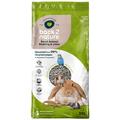In spite of their thick, fluffy coats, winter weather can leave cats really feeling the cold. This might strike you as unlikely as most cats will venture outside in all weathers, but sometimes they do need special attention paying at this time of year.
You could say this is more of a problem for outdoor cats and, when it comes to experiencing wind and rain, then yes, certainly, but cats living indoors will still notice dropping temperatures and low light levels even if they don’t venture out.
What problems can they face in winter?
- Skin and coat issues
- Joint complaints, including mobility issues and pain
- Increased appetite
- Seeking warmth in dangerous places
- Poisoning by toxic substances like antifreeze
Just as cold weather can affect our skin and even exacerbate joint conditions like arthritis, the same is true for your cat.
Cold, wet weather can be very dehydrating for the skin and lead to dryness and itching. You may even notice some flaking in the coat, known as scurfy coat. If you do spot this, consider adding a fish oil supplement to the food as this helps nourish the skin and reduces irritation.
Fish oil can also help with joint issues like arthritis. If you notice your cat struggling with their mobility over winter or they seem in pain, speak to your vet. They may suggest a joint supplement to support and maintain the health of the joints, such as Joint Force Soft Chews, which can be crumbled into food for easy feeding.
A warm, cosy bed is every cat’s idea of Heaven, so make sure your cat has plenty of places to curl up and rest. Heated pads and radiator beds are perfect this time of year and can really make all the difference, especially if your cat is older and feeling a bit stiff in their joints. Just ensure these resting spots are easily accessible to them.
Making sure your cat is drinking plenty of water is also important, as they are just as prone to dehydration in winter as they are in summer (if not, more so) as the body uses lots of energy keeping warm. If they don’t drink freely, it can help to add a bit of water to their food.
You may find the cold weather is increasing your cat’s appetite slightly, which is something to be mindful of. Pet obesity is a real concern, so speak to your vet if you are worried about weight gain.
And finally, make sure your cat is microchipped and their details are kept up-to-date. Outdoor cats will often try and seek warmth in the most unsuitable places, such as a neighbour’s garage or even a car engine where it’s nice and warm.
Obviously, this can be both inconvenient and highly dangerous, so be aware of this when letting your cat outside. If your cat goes missing, a microchip can help reunite you, so it is important to keep this updated.
You can read more on the dangers of antifreeze here.
Hopefully this blog has helped you to know how to support your cat through the dreary winter months, but you will probably find that even the most avid explorers are spending more time inside right now! And who can blame them.
Written by: Abi








